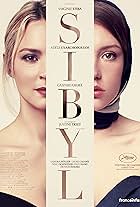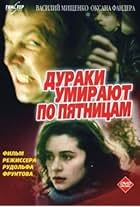Advanced search
- TITLES
- NAMES
- COLLABORATIONS
Search filters
Enter full date
to
or just enter yyyy, or yyyy-mm below
to
to
to
Exclude
Only includes titles with the selected topics
to
In minutes
to
1-13 of 13
- A jaded psychotherapist returns to her first passion of becoming a writer. However, her life is complicated by a desperate film actress who wants her help, and who draws her into a world of questionable ethics.
- In a distant cluster of holiday villas in the skirts of a mountain, three men are digging a well. Their equipment is primitive, their pay miserable. They turn the manual drill hour after hour, day after day, and pray they will strike water quickly. One of them thinks about the money he will bring home, the other enjoys the relative freedom of the job, away from the suffocating city smog and the nine-to-six routine. The third man is a student, working illegally during the vacation to make the money to take his girlfriend to the seaside. The owner of the villa appears from time to time only to urge them to work faster. One day, when they start digging the well, the workers find remains of a human skeleton, a tin ring, several buttons, and a rusty belt buckle buried long ago. When the owner learns about the finding, he orders the workers to get rid of the remains discreetly and to keep silent about them, all to save himself the hassle of an investigation that would prevent him from enjoying his villa. Everybody agrees except the young student, who believes this trace of a human life should not be obliterated and pays with his own life for his convictions.
- Having remained alone in his village house, old Gatyo must move in with his son and daughter-in-law in their flat in the city. They receive him with great understanding and sympathy but cannot find the key to his heart. Torn out of his natural environment and left bewilderingly rootless, this good man cannot adapt himself to the urban way of life. He does not like the mayonnaise he is offered, does not know how to use the lift. The people hurrying in the streets seem to him indifferent, and some even sly and deceitful. He sees the city as a place full of hostile people and inanimate objects. He badly misses the warm human touch of his village. Death is the only possible solution to the tragic conflict of this peasant, crucified between the archaic and the modern, and unable to adapt to the urban lifestyle.
- Two young people living in the country decide to move to the big city by all means. They set off hitch-hiking, but on the road uncertainty and remorse seize them. Is that the right decision? In their journey they face both good intentions and perfidy. Do they finally arrive in the big city or come back to their village?
- The wealthy Yurtalana is the unchallenged master of his family. His elder son, Stoyko, marries a poor girl - Sevda. On the wedding day, Stoyko tells her the family secret: one day Yurtalana saw a small boy stealing from his field; he chases him; threw a stone at him and killed him. Stoyko and his faker buried the boy secretly. Sevda and Stoyko remain childless. After a long illness Stoyko dies. Yurtalana forces his daughter-in-low to leave the rich man's house. Sevda decides to expose her father-in-law with the help of his brother. Yurtalana gives himself up to the police.
- 1920. Luka, a photographer, former freedom fighter for the liberation of Bulgaria, survives in the side skirts of life - forgotten and hated by others. Apostol, whose life Luka once saved brings the suitcase full of money. Apostol leaves the suitcase with Luka because he is convinced that he is the most honest person on earth. At the first moment, Luka is proud by his friend's trust. Time passes and no one comes to claim the money. The papers write that Apostol is killed. Luka's wife convinces him to open the suitcase, but he stops at the last moment. Apostol's brother comes to claim the suitcase. Luka is relieved. However, his wife tells him that she has opened the suitcase and taken half of money. Luka dies.
- The local painter in a small provincial town becomes the main attraction after opening an exhibition. The event is commemorated festively, the elite of the town is there and everyone wants to share his opinion about the art. One of the paintings, however, depicts a fairy dance of young, naked women and vigilant citizens discover similarities with a certain lady. The painting disappears, but in the end it is restored in a totally unexpected way.
- Police officer - Andrei, getting out of prison, where he spent three years, convicted on false charges, visiting an old friend, finds him dead .
- The charming young man Ran is a director in a school in his hometown. His classmate Mariana is his wife. At the first glance, things are like, as they ought to be. In the world of untold words and timid gestures something important is missing - the understanding. He cannot succumb to the routine, hypocrisy and egoism. Ran sees every moment of his everyday life as a part of everlasting human strive for beauty and perfection, which brings him many troubles and causes conflicts with his colleagues and his friends. The intrigues and betrayal of a part of his colleagues during the visitation of a school inspector make him lose his patience. On a public place, he slaps the inspector who destroys the human dignity of the others. There is a court against Ran. He must leave the school. He leaves his wife Mariana who does not understand him. These misfortunes do not stop his search for real values, real work, real love, in another place, another town, another school.
- There are essentially two types of people: those who think with their stomachs, and those who think with their hearts. Conflict between them is inevitable, says the writer Nikolai Haitov. The central character in Cherry Orchard - Dinyo, a secretary of the local communist party organization, and Sava, the assistant manager of the local cooperative farm - also fall into these two categories. Sava often takes the law into his own hands a little, though not for his own benefit, but in the interest of the peasants. Dinyo, on the other hand, is gruff and unsociable but scrupulously honest. He is not prepared to cover up for the assistant manager, who is good at troubleshooting, but whose schemes often leave the secretary holding the baby. Dinyo is demoted and resumes his job as a shepherd but persist in his fight for the truth. The cherry orchard he is tending as a symbol of his faith in the future. Dinyo's totally unwarranted accidental death brings the village drama to its catharsis, which shows him to be victor in the struggle against moral compromise and timeserving.
- 1950. The young people from the suburbs of Sofia are waiting to join the army. Five-childhood friends stand in front of military commission. One of them receives an "unfit" verdict. For him this is a heavy blow and the others decide to help him win over the commission. The boys start to train the rejected one. At some point, he starts to feel like the rest. He is ahead of them... in the love department. The unfix-able happens, the boy dies of exhaustion before he hears "fit" verdict of the commission.












